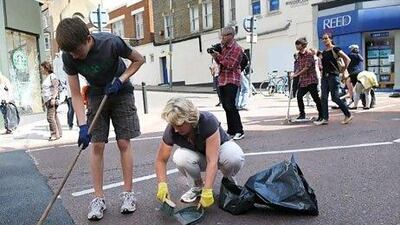In my last notebook, before taking a two-week break in the UK, I wondered whether I would find London the riot-ravaged wasteland portrayed recently on broadcast news, and whether the Notting Hill Carnival would be a celebration of multicultural joy, or another riot.
I'm pleased to be able to report positively on both fronts, but with some qualifications.
I can't claim to have undertaken an exhaustive survey of the city's trouble spots, but sampled some in south, west and north London, so three compass points isn't bad. The good news is that the "broom brigade" (the volunteers who rushed to clear up after the riots of last month) have done a pretty good job.
A lot of the late Victorian-era buildings on Tottenham High Road remain boarded up, a clear sign of the damage that was done in the area where the riots first broke out. But it is no longer the war zone it appeared in the immediate aftermath.
In fact, the only real damage I witnessed was inflicted on the defence of my football team, Tottenham Hotspur, by the scintillating play of Manchester City, in a 5-1 victory. City will be as hard to stop this season as the looting hordes were for the Metropolitan police.
My holiday took in a trip to the English seaside, at Brighton on the south coast, a refreshing contrast to the white sand and warm blue seas of the Gulf. Some fools were even swimming in the steely-grey water, with wetsuits of course.
Driving back from the faded glamour of the Sussex coast was a sobering experience. Travelling through the outer edges of south London, past depressing places such as Norbury, Streatham and Brixton, reminded me that the city still has a big job of urban regeneration on its hands.
The high street shops there were prime looting targets, and the results were still visible in smoke-blackened and boarded-up shop facades.
And so to Notting Hill, the part of London where I was born and which has had its fair share of troubles over the decades. The area has always had a curious socio-demographic mix, from the super-rich to real down-and-outs, with all classes represented in between.
Nowadays, investment bankers rub shoulders with market traders and admen with Rastafarians, which makes for good cultural diversity but can be a short fuse for social confrontation. Often in the past, the Notting Hill Carnival has been the occasion for the latter.
If you haven't experienced it, it's hard to describe the carnival without resorting to the most blatant euphemisms: fun-filled, vibrant, colourful, exotic. All these apply, but are barely adequate to do justice to the 47-year-old event.
In the post-riot environment, fears had been high that it would be the scene of another clash between youths and police, but in the end it all went off peacefully enough, if "peaceful" is an adjective that can ever be used of the carnival.
The area also escaped the worst of last month's riots, with the exception of one posh restaurant where diners found themselves under siege from looters, who were eventually fought off by kitchen staff using frying pans and rolling pins in their defence. Only in Notting Hill.
I have only one gripe about the area, but it is a major one. The Travel Bookshop has closed. The specialist retailer has been in business for 30-odd years, and was a great place to browse and dream of distant shores, before it was made famous by Hugh Grant in the film Notting Hill.
In that move, the character played by Grant worked in the bookshop, and ever since it has been the subject of huge tourist interest, with armies of visitors queuing up to have their photographs taken beneath its globe shop sign.
But no more. In a warning to all small businesses, especially in the publishing sector, it has closed because of financial losses the owner could no longer sustain.
I asked the assistant why it was shutting up, especially with so many potential customers.
"Partly because of Amazon and e-readers," she explained. "But mainly because once they were told Hugh didn't actually work here, ever, they walked out without buying anything."
The film has a lot to answer for.

